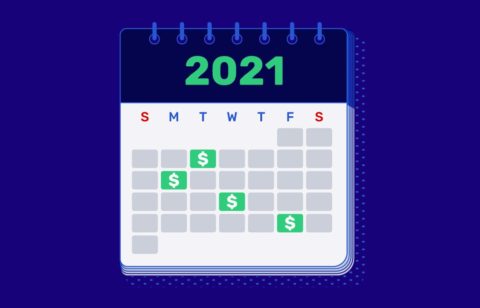With the new year here, it’s time to make some resolutions for the coming year. Maybe you just want to lose a little weight, take on a new hobby, or save for a nice vacation. However, for many, this year will be the year they attempt to get a grip on their finances and start on the path to fiscal stability. In order to do this, consumers will have to figure out ways to save money and manage their finances better. Chances are strong that debt is playing a large role in their desire to make a change.
Americans are virtually swimming in debt. In fact, debt in America has reached an all-time high, surpassing even the astronomically high levels reached during the financial meltdown of the Great Recession that began in 2008. Because interest rates have remained low for so long and banks have eased their lending standards, many consumers have had access to large amounts of credit. For some, this has led to uncontrolled spending and heavy debt loads. Additionally, until recently, there has been little to no wage growth in America, and this has made it hard for Americans to keep up with the cost of living. In that case, consumers have needed to rely on credit cards to make ends meet and survive.
Whatever your reason is to want to save money in 2018, the good news is that are many ways to do it. If you’re creative and disciplined, you can improve your financial situation significantly in 2018 by using some of the following tips.
1. Build a budget
Most Americans don’t budget their money at all. They just go about the month spending and hoping there’s something left over at the end. Unfortunately, most often, there isn’t anything left over; or, even worse, they’ve overspent their monthly income and have had to rely on credit cards. It won’t end well and could very well lead to insolvency and bankruptcy. It’s important to live within your means if you’re going to be financially successful.
Building a budget can save you lots of money. First, it forces you to look at how and where you’re spending your money. If you don’t know how to build a budget, there are numerous resources online to help you. Many financial sites, such as LearnVest, have free tools to help you build a budget.
To build your budget, you’ll need to gather all your financial information. You can start by understanding what your net income consists of. Your net income is what’s in your paycheck after taxes and other deductions, such as amounts going into flexible spending accounts or your 401(k), or amounts going toward paying your share of health insurance and other insurances.
Next, you should pull together your credit card statements, bank statements, and any bills you pay monthly. Your mortgage or rent and car payments are fixed expenses, so it’s unlikely that you’ll be able to find savings there, but they’re an important part of your budget. Finally, you’ll need to get a good understanding of what you’re spending on variable expenses such as food, gas, and entertainment. This is where you’ll have the most opportunity to save money.
Once you see where your money is going, it’ll be simple to find ways to save. Cutting out that gourmet coffee each morning or dining out less can make a big difference at the end of the month. Look at your cable, phone, Internet, and other monthly bills to see if there are ways to reduce them. Also, scour your credit card statements and bank statements for recurring payments you may have forgotten about and no longer need, such as fees for subscriptions to entertainment services, apps, or magazines.
2. Sell items you’re no longer using
You likely have lots of stuff sitting around that you no longer need or want. You can create a nice little savings account just by getting rid of these things and turning them into cash. You can easily set up accounts on online auction and re-selling sites such as Poshmark or eBay where you can list your items for sale. Local consignment shops are also a great place to generate some quick cash from unused clothing, furniture, and tools.
If you want to get rid of items and want an easy way to do it, hold a garage sale. You’ll be surprised at how much money you can generate this way. Consider making it a weekend event or even over a couple of weekends. Many people make a hobby out of hitting garage sales each weekend, and they’ll happily pay you for things you no longer want. In addition, when your garage sale is over, consider having a local charity come pick up what’s left. While you won’t make money on donating the items, you’ll receive a tax deduction for your generosity.
3. Buy used items
Buying items in antique malls, consignment shops, and thrift stores can save you a lot of money, and bargain hunting can actually be fun and rewarding. You’ll pay a fraction of the cost for a used item than you would if you bought new. This is especially true for big-ticket items.
Consider the savings you’d realize if you bought a car that was a year old instead of a brand new one right of the lot. Cars depreciate heavily almost instantly when you sign the purchase papers and drive them home. By buying it a year old, you can let someone else take the depreciation hit and save yourself thousands.
This is also true for other expensive items such as furniture, appliances, and electronics. There are likely local buy/sell sites you can use to find the things you need, including Craigslist.
If you have young children, you know that buying clothes and other essential items can be very expensive. Children grow so fast that their needs for basic items are almost constant. The good news is that you can find these items for a lot less by buying them used. Many times, these items are only slightly used since kids grow so fast. Thrift stores, eBay, garage sales, and consignment shops are all good places to look for items for children at deeply discounted prices.
The bottom line is that you pay a premium for buying items new, and many times you can save 50% or more just by doing a little bargain hunting. This could mean big dollars over the course of a year!
4. Land a second job
If you’re interested in building a nice savings account, a great way to do it is to get a second job or even start a side business. If you’re disciplined and determined to put the extra money away instead of spending it, you can build a good amount of savings in a short amount of time. Consider looking for a work from home job so you don’t have to take on any additional childcare expenses or spend extra gas money on commuting. This can also make having a second job much easier. If looking for a second job doesn’t appeal to you, perhaps ask for a raise or additional hours from your employer.
If you can start a side business, that could also help you earn extra money to put into your savings account. Perhaps find or make an item you can sell through eBay or Amazon or at your local flea market on the weekends. Just make sure that if you’re going to make the effort and give up your free time to work extra hours that you make it worthwhile. Don’t let the extra money get lost in your everyday spending. That’ll just be spinning your wheels and not getting anywhere.
5. Pack lunch and plan your meals
Eating meals out can be very expensive over the long haul. Even if you’re just eating McDonald’s every day for lunch, it can add up quick. Consider taking a packed lunch to work instead to save money. If you consider that most consumers who eat lunch out every day spend more than $50 a week, you can see how economical packing your lunch at home can be. Besides, bringing a packed lunch is most likely going to be not just cheaper but healthier as well.
Meal planning is a great way to save money. By choosing your recipes and making a shopping list, you’ll buy just what you need and not a bunch of things you don’t. This will also keep you from partaking in those budget-busting impulse buys. Be sure to check the weekly flyer for your grocery store so you can take advantage of any sales, coupons, or buy-one-get-one deals on offer. Many times, you can build your meal plan according to what the grocery store has on sale, saving even more money. Once your meal plan is complete, check what you have on hand to make sure you’re not buying items you don’t really need.
Make sure you stick to your shopping list once you start shopping at the grocery store. Try not to go up and down every aisle if you don’t have to. Only visit the aisles that have the things you need. That way, you won’t be tempted to buy extra items that are unnecessary. It’s always a good idea to get to know the meat managers and produce managers at your local store. They can really help you find the sales and maximize your grocery dollar. Meal planning and shopping well can really save you money, and they’ll keep you from eating out as much or ordering in meals such as pizza and Chinese food.
If you do choose to eat out, look for restaurants that have some value-added offerings, especially if you’re dining out with a family. Many restaurants have nights when kids eat free or for half price. These offerings are designed to get families to come in during the slower days, so take advantage of these ways to save money.
Choosing your entertainment wisely represents another big area of opportunity to save money. Instead of catching dinner and a movie, try packing a picnic, grabbing a blanket, and doing a movie in the park in your community. If your only option is a movie theater, consider a cheaper matinee if you can. Look for fun local events such as street festivals and fairs, farmers’ markets, and other events that are free to attend. You can search for events like these online. Many times, communities will publish an events calendar each month to promote local happenings, so be sure to check for that. If you have a botanical garden close to you, check the event calendar there as well. There are many fun things to do if you just do a little investigating.
Saving money is not as hard as it seems. Incorporating a few strategies and tips into your daily habits can help you get started on building a nice savings account. A savings account is a big step forward in providing financial security for you and your family. Make 2018 the year you start saving money and get on the path to a better financial future!





